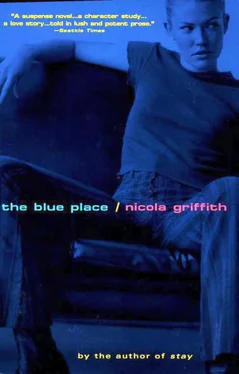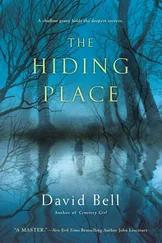“How do you know he was from Atlanta?”
“I feel real bad.”
“How did you know?”
“Asked him…how know where to find you. He said. Call us from here, from where he was. Then he yelled…someone. In his office. ‘What’s time difference between Atlanta and Sweden.’ Something like that. Atlanta.”
“What did he say? What did he sound like?”
“Said: kill art bitch. Julia. Kill her. Kill you.”
“Did he want it to look like an accident?”
“Didn’t care. Just make them dead. That’s what he said. I feel real bad. Weird.”
“And that’s all? Do McCall and Ginger know where Julia is staying in Oslo?”
“Didn’t. Might now. Help me.” He tried to lift his hand but the hypothermia had him now and only a couple of fingers twitched. The air smelt like rain.
“Help me,” he said again.
I ran through events in my head: all my possessions, anything to link me to a body, were in my pack, and the bootprints would wash away in the rain. Just my prints on the rifle, then.
“I’ll need your jacket.”
It was sodden, and he couldn’t even move an arm to help me. In the end, I just tore off the collar and took that over to my pack. I had to grope around for the rifle. I wiped it free of prints and used the collar to carry it to the water. It made a thin, flat splash.
“What?” he said.
The clip followed. I knelt by John Turkel and put the torn collar in his hand. I don’t think he even felt it.
“Please. Help me.” Barely a whisper.
I picked up my pack. “There isn’t time.”
The clouds parted and I stood up into a suddenly monochrome world: water sleek and black; sedge leached lithium grey; moonlight lying like pools of mercury on the upturned faces of graphite flowers. Nature, thinking there was no one to observe, was letting slide the greens and blues, the honey yellows, and showing her other face: flat, indifferent, anonymous.
Only trolls, fools and desperate people walk the fjell at night when all is shadow and deeper shadow. I knew that I could not walk down a mountain along a trail I didn’t know with muscles already cold and screaming with toxins and fatigue after the icewater of the lake, expecting my foot to twist on an unseen stone or skitter down scree, to any minute tumble into a gully or thump into a tree; knew I could not carefully place one foot in front of another for three or four miles with a hole punched in my back and a slow leak. So I ran.
Cloud closed over the moon and the rain came down, gentle and light, almost like mist. I ran like a deer, snuffing the scents lifted by the rain, veering away from the pine or wet stone that warned of danger and towards the safety of wet grass and opening flowers, relying on the tiny sound of a pebble rattling under my boot and tumbling away down to my left to warn me of a gully, ran like a deer that ignores a bullet through the shoulder because the wound is not the urgent thing, the urgent thing is the adrenalin stride, the run, covering the ground, the need to keep going, to never stop, to leap brooks and low-lying branches, to crash through brush, to weave through trees and skitter and fall on loose stone and get up without pausing, without thinking, without missing a beat. The branch whipping across the face, the slow hot leak of blood down the back and deeper tear of skin where the pack pulled open the wound, did not matter, because pain is just a message. I ignored it, washed it away with adrenalin and endorphins and the rhythm of breath and blood and bone.
Three miles, Turkel had said, but that was in daylight with map in hand, when you could plot the perfect diagonal. I was going to have to run farther; to get down into the valley, then run north. Five miles, perhaps. More. The rain came down harder, the underbrush thickened. My boots began to slide in mud. I shortened my stride a little and ran on.
Breath whistling in and out through nostrils and mouth, thigh muscles pumping—contract, relax, contract, relax—toes gripping inside boots and wearing raw against wet wool. Sweat running down my belly.
It was when each stride started coming shorter than the last and the pressure was on calves, not quadriceps, that I realized I had reached the floor of the valley and was starting up the other side. I turned left and ran north.
The valley trail under the trees was so dark I would have missed the place but for the suddenly alien scent of tires and good-quality leather getting wet. Then there it was, windshield streaming in the rain, both front windows open.
It was when I sat down on civilized leather, when I turned the key and the dark and the rain were outside, that the pain snapped like a gin trap on my back, biting down so hard it seemed to drive its teeth into my lungs and tear my breath apart. The headlights shining into the rain started to recede, as though I were on the back of a train heading into a long tunnel.
I slewed the Volvo to a stop outside the seter and stumbled in. It was two o’clock in the morning. The phone was on the table. I couldn’t remember the phone number of the Hotel Bristol. I called information. They could not understand me.
“Oslo,” I repeated. It sounded muddy and slurred. I shaped the next words carefully. “Hotel Bristol. Kristian VII’s gate.”
They gave me the number. It sounded like surf crashing in my ears.
“Again. Please. Give me the number again.”
“22 41 58 40.”
I had no pen, no paper. 22 41 48…no, 58. 22 58…I called again. The same woman. She gave me the number again. 22 41 58 40. I tapped it in carefully. It rang and rang and rang. Blood dripped down my back.
“Hotel Bristol.” Bright, young, male.
“I need to talk to one of your guests, Julia Lyons-Bennet.”
“Perhaps I could take a message.” His voice started to slide away. I breathed deep.
“No.” I had to hold on. Just another minute, another two. “I have to speak to her, now.”
“It is after two o’clock. In the morning.”
“I am not drunk. I am not in a different time zone. This is an emergency. Please put my call through.”
“After ten p.m. it is our policy that guests—”
“I wish to speak to the night manager.”
“Ma’am, the—”
“Get the night manager.”
He put me on hold. Pain pulsed like a candle under a glass sucking in oxygen and flaring, using up the oxygen and dying, sucking more and flaring; heating my nerve to a white-hot wire. I walked, very slowly, very upright, to the kitchen. Hold on. Hold on for just another minute, another two. I had to tuck the phone under my chin while I opened the cupboard and pulled out half a loaf of bread and a pot of sweet jam. I couldn’t cut the bread with just one hand, so I jammed it between my hip and the counter and tore off chunks, which I dipped straight into the jar. It tasted like dirt, but I chewed and swallowed, chewed and swallowed. Still on hold. The refrigerator yielded a wedge of yellow cheese wrapped in wax paper. My hearing came back in a tumble of discrete sounds: the prickles in each exhalation as it left my lungs, the creak of bone in my elbow as I shifted slightly, soft slap of white paper against cheese. The clarity of delirium. Just another minute, another two.
The phone suddenly seemed to open out as the night manager punched the hold button to off and the myriad hums of a computerized office on standby filled the earpiece. He—and I could tell it was a he from the harmonics of his inhalation—drew breath, but I spoke first.
“My name is Aud Torvingen. To whom do I have the pleasure of speaking?”
“Rolf Lothbrok, the night manager.”
“Rolf, if you check your records you will find that Ms. Lyons-Bennet and I stayed with you two weeks ago. It is vitally important, urgent, that I speak to Ms. Lyons-Bennet now. Not later, or soon, but now.” The carbohydrates were metabolising now, hitting my bloodstream, and everything sparkled. Even my words seemed clear: cool, measured, precise. Rolf must have thought so, too.
Читать дальше












